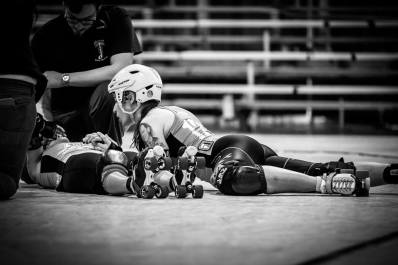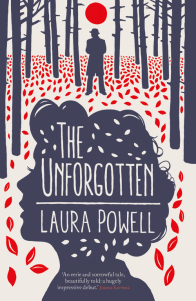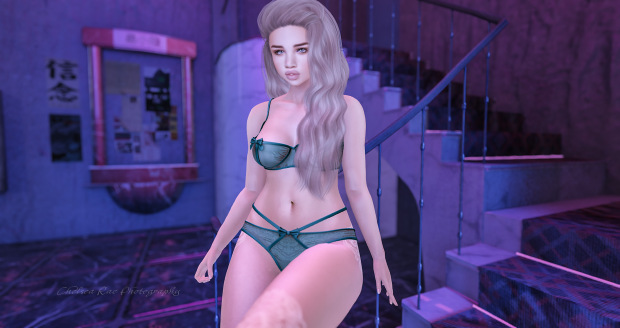Well, it’s been quite awhile since my last blog entry.
To attempt a recap of all that has transpired in one post would be a challenge (and a little excessive) and so I have decided to break it up a little bit.
I wrote last during the off-season with the Terminal City Rollergirls. I was deep into cross-training and excited about recovering from a physically tough year on the track as well as strengthening my body and mental game.
We started practices again in January 2016 and the announcement that our league would be hosting the next WFTDA (Women’s Flat Track Derby Association) Playoffs in Vancouver made the upcoming season one of the most significant to date for my team and myself as a skater.
Practices were intense as we were preparing to compete in a sport that has continually (and rapidly) evolved into a more and more physically demanding and strategic game. As a member of the teams’ Jammer rotation, the pressure was high to be in top shape and ready to skate for all the upcoming tournaments. Every game counted towards our ranking in Playoffs and the possibility of qualifying for Championships, a first for our team and league.
In the middle of March 2016, during our ramp up towards the upcoming season, I was scrimmaging with my team during a late night practice. As it was near the end of practice and we were cold (we practiced outdoors) and tired, our Coach advised our blockers to “not destroy” our Jammers, (meaning, if there was an opportunity for a “big hit”, the blockers did not need to follow through, but simply give their team mate a little “bump” to let them know they “could have been destroyed”).
Looking back, I am not sure that I agree with this kind of mindset when on the track. This is because, as I was skating around turn 3, I saw the other Jammer was about to call off the jam, and so I eased my pace and turned to face the inside of the track…ready to skate back to the sidelines, when one of my team mates, an opposing blocker, instinctively saw the opportunity to hit me out. I wasn’t expecting a “big hit” and so what happened next is probably pretty obvious, I took a hard hit to my chest that sent me backwards, causing my shoulder and head hit the pavement first as I did a bit of backwards somersault.
I shook it off though. No tears were shed. I was definitely caught off-guard, and my team mate was extremely apologetic (it’s blockers’ instinct! I totally get that) but I decided to take off my skates and finish up practice a few minutes early.
At that time I still liked to bargain with myself the definition of “Concussion” vs. “Bumping my head”. In that scenario, I told myself I had just “Bumped my head” , and rather than see a doctor or treat it as anything more serious, I just decided to take a break from practice for the next week. I continued to workout and go to work as though nothing had happened.
The next practice I attended was April 9, 2016. We had a game lined up with a Men’s team the following day and I had already decided that I did not want to play in that game. My focus was to be prepared for the upcoming season and games that would count towards our rankings. From past experiences, I felt it was safer for me to sit out and stay healthy (injury free).
When I communicated this to my team, to be honest, I felt a lot of pressure to change my mind. I was surprised at first that my team mates were encouraging me to skate even though I had voiced my concerns.
In the end, I showed up the following evening at the arena, wanting to be a team player, and also to provide support to my team mates who had never skated against a men’s team before. Unfortunately, I didn’t make it through the first half.
On my third or fourth jam, I was near the front of the pack, facing the inside of the track in turn 2. I had been on my toe-stops, inches from the outside of the track, attempting to regain my balance from a previous hit, when an opposing blocker came up and hit me in my chest. It was a very powerful hit that sent me flying backwards (I literally flew) and this time, the back of my head took the full force of the impact.

I knew right away that something was wrong. All I could do was hold my head and be as still as possible. Suddenly, everything seemed very quiet. I remember feeling very upset that people were asking me if I was okay and trying to take off my helmet and unlace my skates.
I had always been able to bounce back from a hit, no matter how hard it was, but this time I didn’t want to get up.
I knew as I laid there, that I wasn’t going to be able to finish this game.
Eventually, I was helped off the track and into the teams’ locker room. I could not stop crying (I am not one to cry from a hit) and found myself vomiting several times into a garbage can. I felt overwhelmed and unable to slow down my breathing. I felt panicked and terrified. This wasn’t something I had ever felt before.
I ended up leaving the arena while the game continued to go on. I cried outside on the grass in the dark, plugging my ears because everything felt bright and loud and invasive. When the game was ending, I went back inside, wanting to be with my team. I felt like I was in a cloud. I borrowed some ear protectors and walked around feeling stunned.
On the drive home I laid in the backseat and continued to cry. I kept reliving the hit over and over in my mind, thinking about the back of my head slamming into the cement…knowing that it hit the ground “way too hard” this time. This was more than a “Bump”.
In the days that followed, I felt like a zombie. When I called my Mom to tell her about the game, I felt even worse, because, before I could even get the words out to tell her what had happened, she said “You better not have hit your head”.
My older brother played Junior hockey for a few years in his late teens/early twenties. He had suffered so many concussions in such a short period of time that he had to retire. To this day he suffers symptoms of those head injuries. My Mom did not want me to risk the same outcome.
But I was still not ready to give up Roller Derby yet. And so, when I went to the doctor that following week to get my “Return to Play” note, I lied about my symptoms. I didn’t tell him about the crying or the vomiting. I didn’t tell him that I’ve had several concussions in the past. I didn’t tell him about the fog I had been under or that I had been feeling depressed and sensitive to light and noise. Instead, I told him that I fell, bumped my head, and required a “Return to Full Contact Roller Derby” doctor’s note, due to league policy, and needed to get back to practice and prepare for a very important season.
He recommended I stay off-skates for two weeks and I did. But again, I continued to workout and go to work (I have an office job). However, I started to realize I wasn’t feeling quite myself. I was having trouble sleeping and focusing at work. After considering how badly I wanted to skate in Playoffs (and skate the rest of the season), I decided that jumping back on the track right away may not be the best choice.
Our next tournament was the Big O (Eugene, Oregon), scheduled for April 29, 30 and May 2, 2016. I hadn’t missed a tournament ever since joining the team in 2013, but felt it was worth missing if it meant I could skate the rest of the season. At first my team was supportive of my decision, they even purchased me a new helmet (as mine had been cracked from the hit and was no longer safe) and checked in on me while I was away from practice.
As the tournament dates got nearer, my team asked if I would attend as a “spare”. I agreed, solely to provide support on the bench to my fellow Jammers. I did not intend to skate.
The Friday night we arrived in Eugene, I was spoken to privately by my team leadership and told that I was going to be rostered for the first game. I was surprised and to be honest, my ego was inflated. I thought, wow, they really want me to skate! My team needs me! And so, once again, I laced up my skates and played.
The first game I came out unscathed. I felt good. Actually, I felt on fire! Then we played the second game…and I took another hit to my head.
This time I was skating, head down, making a pass, when an opposing blocker took the opportunity for a “booty block” and unintentionally made contact with the side of my helmet.
 I went down immediately.
I went down immediately.
Usually, a hit like this wouldn’t have even slowed me down, but it felt like my superpowers were gone. My head had become this gooey jiggly jellyfish that was completely vulnerable to even the slightest touch. I felt dizzy and disoriented. I laid on the track for minutes (which felt like hours) before finally being wheeled off in a wheelchair. I couldn’t stomach standing up to skate off on my own. 
Even though I went to First Aid right away, I was released moments later to go back to my team. Again, I had lied to the attendants that were checking me out about any previous concussions. I lied about the dizziness. My immediate desire was just to get back to the bench.
My Coach sat me for the rest of that half of the game, but when the second half came around, I was back in the rotation.
Before the weekend was over I was in a lot of pain. My neck and shoulder ached and I could barley lift my arm up. My team mates tried giving me massages, pain killers and ointments to ease my discomfort. The 6 hour drive home was almost unbearable.
This time I went to the doctor right away due to the severeness of my shoulder and back pain. I was diagnosed with whiplash and told I should stay off-skates for 4-6 weeks to fully recover. I tried everything this time to feel better. I stopped working out, I went for Prolotherapy treatments, I booked massage and chiropractor appointments, I took supplements and vitamins, and I focused on a proper recovery so that I could return to practice back at 100%.
I told myself that this was all just a “rocky” start to the season and that I would bounce back, as I had from MANY previous sports injuries.
It was the longest I had ever taken during a season to recover from an injury. When I finally got the “go-ahead” in June to rejoin my team and skate non-contact I felt…off. It’s not easy to explain but something had changed. I felt vulnerable. I felt uncertain. Most of all, I felt scared.
I skated the first half of practice with this pit in my stomach. When it was time for scrimmaging, I sat down in the middle of the track and watched my team work on drills and my fellow Jammers race into the walls of blockers, players being shuffled around, knocked over and off-balance…and I felt anxious. Suddenly the lights overhead felt extra bright, and the shouting and whistles were more than I could handle.
I decided to take off my gear and do a conditioning circuit, off to the side, in a corner of the rink.
When practice was over and I hopped in to my regular carpool for the drive home I knew I that this was the last time I’d skate with my team.
The pit in my stomach had become even heavier, and though I was terrified to acknowledge that it was there, I knew that these new emotions couldn’t be ignored.
I didn’t feel safe anymore.
Link to my official retirement video here (YouTube: Two Girls No F*cks)
Stay tuned for my next blog entry: Calling It Off: The 5 Stages of Roller Derby Retirement
To learn more about concussions, please click here. Awareness of symptoms and proper recovery is the first step in protecting yourself and your fellow athletes.
Advertisements Share this:





